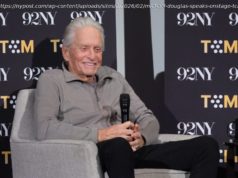The British media tries to figure out the American president.
LONDON—“It was like watching a news conference by Dr. Jekyll and Mr. Hyde,” John Rentoul, the chief political commentator for The Independent, told the BBC, standing on the broadcaster’s balcony while anti-Trump demonstrators streamed by below. He was talking about President Donald Trump’s press conference on Friday afternoon with Prime Minister Theresa May, in which Trump at turns read talking points about the importance of the trans-Atlantic alliance, veered off script into strange tangents, and insulted members of the press.
Trump has brought his unique nonscheduled style to Britain, and the British press doesn’t seem quite sure what to make of it. Britain is the country where journalists routinely spar with politicians; where the state broadcaster, the BBC, prides itself on speaking truth to the government; where a tabloid press may have helped bring about Brexit; and where in Prime Minister’s Question Time MPs hurl insults in ritualized verbal violence so sharp that other world leaders might not come out alive. But what of Trump? How to handle his sometimes exaggerated, sometimes self-contradictory, sometimes meandering, sometimes flatly false remarks? Or, as one sign at a protest rally in London on Friday read, “Where Do I Start?”
In Friday’s news conference, Trump lashed out at CNN, which he called “fake news,” and NBC, which he called “dishonest reporting,” and gave a lot of question time to Fox News. For some members of the British press, this was apparently something new to behold. Afterwards, one BBC commentator said he was “struck by the way any hostile question is dismissed as ‘dishonest reporting’ or ‘fake news.’” He kept recounting the story of “the poor bloke from CNN,” whom Trump passed over in the press conference. “That’s part of the way he operates.”
One of the most dramatic moments was when Trump called an on-the-record bombshell interview he had given to The Sun “fake news”—even though The Sun, a tabloid owned by Rupert Murdoch, had quoted the president verbatim and even posted audio from the interview, in which Trump had lambasted May over her handling of Brexit. With the banner headline “May Has Wrecked Brexit… US Deal Is Off!”, the interview landed Thursday evening, just as Trump was sitting down to a gala dinner hosted by May at Blenheim Palace in Oxfordshire, the birthplace of Winston Churchill.
In the interview, Trump criticized May’s interest in a “soft Brexit,” a line taken by Boris Johnson, who quit as foreign secretary earlier this week to protest that very point. (The line is also taken by Nigel Farage, a leading Brexiteer and now Fox News commentator, who told the BBC he’d been discussing Brexit with members of Trump’s circle; Politico reported he’s angling for a meeting with Trump.) More importantly, Trump also told The Sun that a soft Brexit would scuttle any possible bilateral trade deals with the United States.
At the press conference, Trump tried to walk things back—sort of. He said the U. S. would continue to trade with Britain. Then he poured effusive praise on May. And said he’d apologized to her.
Wait, what?
“I thought it was a surprising presser,” Katy Balls, the political correspondent for The Spectator, said. “It was strange to watch really, that basically we’ve gotten to such a drastic point—what seemed to be the president saying he doesn’t support Theresa May on Brexit, then his saccharine support of her. I don’t think it was particularly coherent.”
How to frame quotes by someone who bends reality and calls his own statements fake news? Does the president understand what he’s doing?
Before the press conference, Tom Newton Dunn, the politics editor of The Sun who conducted the interview with Trump, said he wasn’t sure Trump understood how damaging his remarks on Brexit could be to May, even though the president was clearly criticizing her. “If Theresa May gets Brexit wrong here then she’s out of a job,” Dunn told CNN . “If you start talking into that sort of territory, I really think anyone who’s done Politics 101 knows that’s going to cause trouble.”
Still he added, maybe Trump didn’t think it through. “I don’t really think the president wanted to come here and bring Theresa May a wrapped hand grenade. I think he was being honest,” Dunn said. “He talks straight, most of the time. Perhaps not to CNN.” He said they’d done the interview in Brussels on Wednesday morning but held it a day, timing its publication for maximum impact.
“We’re a bit obsessed with manners on this side of the pond as you know,” Dunn added. “It seems a tad discourteous to drop that wrapped hand grenade to your host when your host has gone out of the way to put on such a show for you.” In another interview with the BBC, Dunn had compared Trump to “a medieval emperor.” “I was struck in the room that whatever the president says, goes,” Dunn told CNN. “He wasn’t contradicted. It was not scripted, it was all coming from the heart.”
After the press conference, The Sun issued a statement that could be a case study in a semiotics textbook: “We stand by our reporting and the quotes we used—including those where the President was positive about the Prime Minister, in both the paper and in our audio—and we’re delighted that the President essentially retracted his original charge against the paper later in the press conference, » BuzzFeed quoted a Sun spokesperson saying. « To say the President used ‘fake news’ with any serious intent is, well… ‘fake news.’ »






